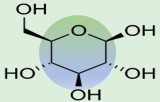Hyperglycemic hormones are crucial regulators of glucose homeostasis in animals, counteracting the effects of insulin to maintain adequate blood glucose levels. These hormones are essential for energy mobilization during stress, fasting, and exercise, ensuring that cells have sufficient fuel to function.
Crustacean Hyperglycemic Hormone (CHH) in crustaceans, is a key neuropeptide that plays a central role in metabolism and physiology, acting as a stress hormone and mediating stress-induced hyperglycemia. This hormone is specific to crustaceans and highlights the unique regulatory mechanisms found within invertebrate systems.
Research Applications and Clinical Significance (Animal-Focused):
-
Stress Response: Hyperglycemic hormones mediate the "fight-or-flight" response, preparing animals to cope with stressful situations. Understanding these hormonal responses is critical for animal welfare, conservation efforts, and veterinary medicine.
- Crustacean Physiology: CHH research provides insights into crustacean metabolism, stress responses, and adaptation to environmental changes.
- Comparative Endocrinology: Investigating hyperglycemic hormones across different animal phyla provides valuable insights into the evolution of metabolic regulation.


